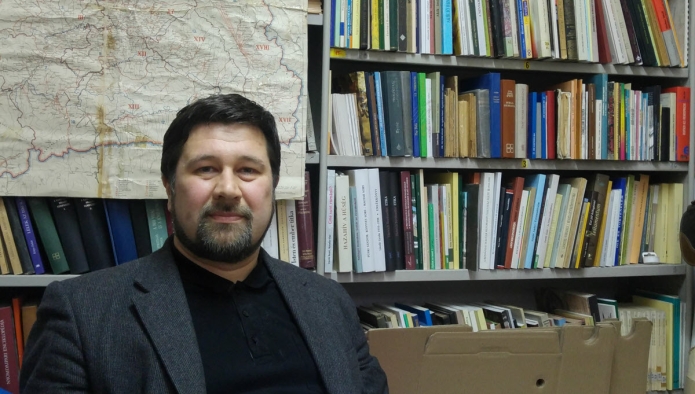In accordance with its mission, the Protestant Theological Institute in Cluj-Napoca aims to train theologians who, upon completing their studies, will engage in pastoral service in various congregations in Transylvania. However, the familiarity with the Transylvanian congregations of most recently enrolled students is largely limited to the ecclesiastical world from which they arrived at the Theological Institute. We discussed about this topic with Árpád Sógor, instructor and leader of the Practical congregational knowledge course.
What does a theological student aspiring to become a pastor know about the Reformed congregations in Transylvania, Romania?

In accordance with its mission, the Protestant Theological Institute in Cluj-Napoca aims to train theologians who, upon completing their studies, will engage in pastoral service in various congregations in Transylvania. However, the familiarity with the Transylvanian congregations of most recently enrolled students is largely limited to the ecclesiastical world from which they arrived at the Theological Institute. Nonetheless, due to the specific practical perspectives of the theological studies, it is fundamentally important for theologians to become familiar with the diverse church and congregational environment where they intend to serve in the future.
This is the reason why, in the Reformed theological curriculum, a few years ago, a subject called "Practical congregational knowledge" was introduced. The significance of this practical subject has been emphasized by theological professor Attila Kelemen, who coordinated it for several years. Since the 2017-2018 academic year, Árpád Sógor, a youth pastor, has been leading the practice based on institutional assignment. We asked him about the experiences of the first semester and plans for the second semester.
Can you summarize in a few words why this practice is needed and how students relate to it?
The practice, announced for first-year students, was born out of the idea that everyone comes from a specific congregation to the Theological Institute and thinks that all congregations are similar to theirs. At the Institute, students realise that their fellow students have different views on congregations.
During the first semester, we initially held some introductory classes. We hosted retired theology professor Zsolt Kozma, whose advice to first-year students was read by the students beforehand, and then they could ask questions from the Professor.
Students had to write two papers, one about a freely chosen biblical person with whom they can identify, expressing some thoughts about how they imagine themselves in pastoral service and what plans and dreams they have in this regard. In the second paper, they could choose from topics related to pastoral service and write a short essay using studies from "Az Út" and "Református Szemle" journals and the issued bibliography.
In the introductory classes, we discussed the life of a theologian, the importance of self-awareness, and the need to be aware of our strengths and weaknesses in service. Knowing our weaknesses is not for despair but to be clear about the areas where we need to pay special attention to self-improvement.
What was the practical aspect of the first-semester congregational awareness?
Initially, we visited nearby congregations in Cluj. The Lower Town congregation was introduced by József Székely, the Monostor congregation by Csaba Kállay, and the Tóköz congregation by Péter Visky. They talked about congregational life, the joys and challenges of pastoral service. Students listened with great interest to the reports and asked questions to the pastors. After each visit, there was an evaluative discussion at the Theology Institute, where everyone had the opportunity to express their opinions: what they liked, what was unusual or had a new impact.
What are your plans for the second semester?
This practical class is scheduled in the timetable as a two-hour session per week. So far, we have only been able to visit congregations in Cluj. With the support of Csaba Balogh, the dean, and the future support of the Fundament Foundation in the Netherlands, in the second semester, we will also reach more distant congregations. In early March, we will embark on a two-day trip to southern Transylvania, where Botond Gudor, the youth pastor from Gyulafehérvár (Alba Iulia), will be our guide. We will visit depopulated churches as well as live congregations. We will gather information about the situation of scattered congregations in southern Transylvania and meet with Hungarian Reformed people who, despite living in a minority, want to preserve their identity. I believe that for some theologians who come from areas where the Hungarian population is in the majority, it will be a poignant experience to see that in some places, the Hungarian language is sacred, spoken only in the church, and outside the church, the Reformed congregation members switch to Romanian.
We will stay in Deva, where Csaba Rátoni, the young pastor of the Deva congregation, will talk about various congregational programs and the congregation's desire to live. The small team of theologians will also compete in a football match with the football team of the Hungarian community in Deva.
What other trips is the class planning for the academic year?
Three more trips are in the planning stages for the spring. We plan a one-day tour in Szilágyság, one in Kalotaszeg, and one in the Maros region, where we will visit congregations of various sizes and ask pastors about the life of their congregations and what advice they have for today's young theologians.
We are grateful to the congregations and pastors for hosting us during our journey, and our students from various towns in Transylvania can get to know the congregations of other regions, see good examples, and often confront the realities of congregational life, thereby expanding their horizons. It is our not-so-secret intention to express with these visits what we have always thought, that theology should not be separated from the congregations. We consider the living connection between the Theological Institute and the mother church congregation important. Thanks be to God that we can start this semester with a class of 26 students, and we can ask Him to bless our plans.